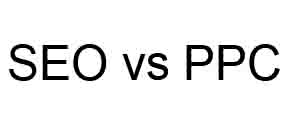When starting any new marketing campaign, the incorporation of a strategic plan outling how to effectively increase site traffic from search engines is a high priority for many business, but, which tactics are best to use, search engine optimisation (SEO) or pay-per-click (PPC) advertising?
Having working in PR for four years now, I’ve stood witness to the colossal rise of SEO as well as the positive effect a successful campaign can have on a business and its bottom line. PPC on the other hand, does certainly have its own advantages but in this article, I’m going to provide examples of why I would recommend SEO over PPC.
Cost
There are of course cost implications with both SEO and PPC campaigns. PPC, as the name suggests, charges every time a link is clicked, but with costs varying from 25p to £2.50 per click, an uncapped campaign can amount to a huge and potentially crippling fee for a business at the end of each month. Although a daily set amount can be established to ensure costs don’t spiral out of control, once this figure is reached, the ad is removed from the sponsored results and the campaign effectively stops until the following day, week or month.
The initial set-up of a SEO campaign can take a week or two and if a business is employing an external agency, this can, at times, incur additional costs. With this I’m firstly referring to the website review i.e. ensuring landing page copy is correct and rewriting it if necessary, and certifying all urls, H1, H2 and meta tags are all Google friendly. Once the site is optimised, the ongoing costs relate to SEO press release creation and distribution. We advise that four releases are created each month with £500 set aside to ensure that the releases can be distributed to reputable news wires where the results will be much more beneficial.
PPC costs are undoubtedly ongoing but, as soon as payment stops, the campaign stops. Conversely, a successful SEO campaign can continue to benefit a site long after initial activity, meaning in the long term, it is the more cost-effective option.
Conversion rates
This is where the ultimate benefits are recognised. A PPC ad will appear in the sponsored link section of the search results, whereas an optimised website will appear in the organic listings. Research has revealed that there is an average click ratio of around 70-30 in favour of organic listings, which means in its most basic form, websites can expect over twice as much traffic from a SEO campaign as they can from PPC.
With this, businesses employing SEO tactics can expect to generate more business, and therefore revenue, which will hopefully be more than suffice to cover any campaign outgoings.
There’s additionally no way of controlling site visitors and search engines don’t discriminate, charging a PPC client whether the visitor is genuinely interested in the business and its products or services or whether the visitor clicks through by mistake.
Of course SEO does have a few negatives itself. It can, for instance, take up to a couple of months for a site to appear in the organic search results, however, by comparison the likely return on overall investment in the long-term will be exponentially more than that of PPC.
There are indeed many other considerations to take in to account with each option but, in terms of generating site traffic, offset again cost and longevity, SEO takes the top spot not only in my eyes, but in the eyes of many businesses who have incorporated and benefitted from a SEO lead campaign.
About Punch Coomunications
Punch is a UK based, boutique PR, social media and SEO Agency with the skill set, reach and client base of a global agency. To find out more about and Punch’s integrated services, please visit punchcomms.com, call the team on+44 (0)1858 41160, or follow @punchcomms or facebook.com/punchcommunications.






